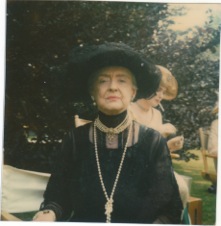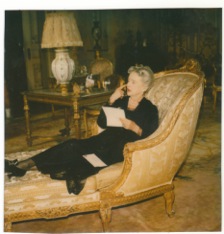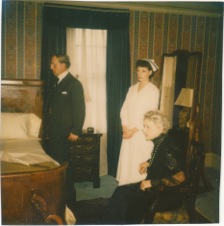Bette Davis: Tireless Advocate for her Crew
- Kathryn Sermak
- Sep 4, 2017
- 3 min read
Updated: Aug 31, 2022
Bette Davis was a tireless advocate for the rights of the crew who worked alongside her. She often commented to me on how much they had to do, the long hours they worked and how little they were paid when considering how vital their contribution was to the movie. I saw this first hand when we worked on the 1982 television mini-series Little Gloria, Happy At Last.
In the series, Miss D played Alice Gwynne Vanderbilt, the grandmother of Gloria Vanderbilt. The cast was phenomenal - Angela Lansbury, Christopher Plummer, Martin Balsam, Maureen Stapleton and Glynnis Johns. The sets were sumptuous, beautifully recreating the grandeur of the wealthy in the 1920s. Women wore creamy lace dresses and magnificent hats and the men sported top coats and tails or seersucker pants and jackets. We filmed in New York, Newport and Palm Beach - and always under constant budgetary pressure from the producers in Los Angeles.
The party scenes featured fifty or more extras alongside the top stars in the major roles. Because of the large cast, the producers in Los Angeles wanted to maximize each day on the set and could were harsh when director Waris Hussein fell behind schedule. When the assistant director showed Miss D the day's work, she'd smile at the young man all while knowing that what he had laid out for them was impossible to accomplish.
Miss D advised the costume designer Julie Weiss that she needed to stick up for herself more. Outfitting this large of a cast in period clothing was a monumental task and Miss D recommended she insist on hiring more people to help her. Miss Weiss said that the producers would not agree to that.
This all came to a head when the movie company journeyed from New York to Florida to film in Palm Beach. Glynnis Johns, who played Gloria Vanderbilt’s mother, did not like to fly. She took the train from New York to Florida and Miss D was concerned that she would not have enough energy after that long journey to be at her best on the set.
As everyone waited for her to arrive, Miss D assessed the state of the crew. They didn’t look their best either. They were dragging through their duties. Most telling - the set, normally filled with laughter, was a bit muted.
Suddenly Miss D developed a terrible cold.
I remember standing with her in her hotel suite as she called the director and put on an Oscar-worthy performance. Oh, she was so very, very sorry. She couldn’t believe that she had come down with this terrible cold (cough, cough, BIG COUGH). She wanted to keep going. She hated so much to hold everyone up. But she had consulted with a doctor and the doctor advised her that she was CONTAGIOUS and feared that if she came to work she might spread this to the crew, delaying the schedule even further.
I wondered if Mr. Hussein was in on this ploy. Miss D and he had had many conversations about the impossible demands of the California producers, none of whom had come to the set and seen how hard everyone was working. Regardless, Miss D’s “cold” got everyone two days rest and the set became a much more cheerful and productive place.
Miss D told me that "the advantage in this film was the great cast. The disadvantage was jumping from place to place, from the freezing cold on Long Island to the terrible heat of Palm Beach."
Miss D was honored to be nominated for an Emmy for her performance. Had she won she would have shared the award with Peggy Shannon for the way she dressed her hair, which added tremendously to the effectiveness of her performance. And with Julie Weiss - whose costumes were so beautiful.
Order MISS D & ME: Life with the Invincible Bette Davis HERE.






Comments